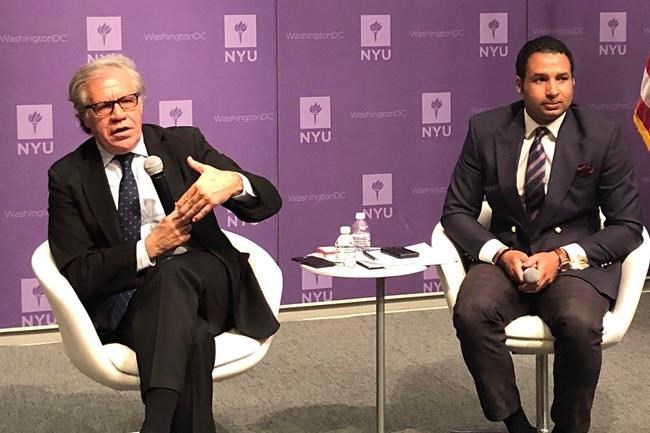
Secretary General of the Organization of American States, Luis Almagro, left, talks to Geovanny Vicente Romero during an event held at the Washington campus of New York University on Wednesday April 24, 2019. (AP Photo/Luis Alonso Lugo)
April 24, 2019 - 3:17 PM
MANAGUA, Nicaragua - Nicaragua's economy is in "free fall" a year after anti-government protests were violently repressed by the government and its supporters, the country's leading business association said Wednesday.
Sectors such as tour operators, auto dealers and medical equipment providers have seen their sales fall 77.5%, 75% and 53.5%, respectively, in the past year, the Superior Council of Private Business said.
"We thought we were on the precipice, but the latest figures show that we lost our footing and are in free fall," said Guillermo Jacoby, an official with the association.
Protests began in April 2018 against cuts to social security pensions, but quickly spread to other grievances against the government of President Daniel Ortega. According to the Inter-American Commission on Human Rights, at least 325 people were killed in the government crackdown.
"The drop in consumption has been tremendous and reflects the crisis of confidence which exists in the country and creates a great deal of uncertainty in the economy," Jacoby said.
He described Nicaragua's economic state as one of "stagflation" characterized by high inflation and economic stagnation. He warned that new taxes drove down sales of agricultural inputs and products, which would likely lead to a significant reduction in how much land was planted and how much it produced.
In 2018, domestic investment dropped 25% and foreign investment plummeted 53%, Jacoby said. One area that increased was remittances, which rose 8% as Nicaraguans outside the country sent more money home.
The association said 100,000 people had lost jobs in the private sector in the past year. Last year, economists estimated that the economy overall had shed 200,000 jobs.
The business group said its report was based on data provided by private companies because the government has not provided access to its current figures.
Exports for the first three months of this year were down 6% from the same period last year.
"The panorama is negative in every sense," Jacoby said. "After the recession we will enter into a depression and deflation: There won't be cash flow, there won't be consumption and therefore there will be unemployment."
He said the country's best hope to avoid economic catastrophe was a political agreement between the government and opposition.
Also Wednesday, Luis Almagro, secretary general of the Organization of American States, said the government and opposition need to stop lying to the OAS if there is to be any hope that the latest round of dialogue will succeed.
As an example he said that one side asked the OAS to convene a meeting with all parties, but then the side that requested the meeting didn't attend.
"We need maturity from both sides," Almagro said. "We need people to stop lying to us, that is very important. We don't like when people play political games."
The OAS and the Vatican are witnessing the latest round of talks between the opposition and government.
Both sides met with OAS Wednesday to discuss the electoral reform topic.
__
AP writer Luis Alonso Lugo in Washington contributed to this report.
News from © The Associated Press, 2019